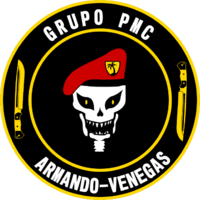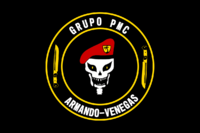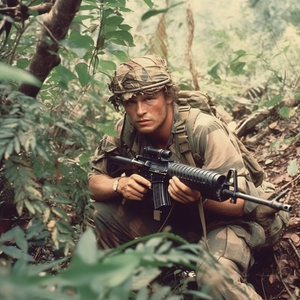Armando-Venegas Group
This article is incomplete because it is pending further input from participants, or it is a work-in-progress by one author. Please comment on this article's talk page to share your input, comments and questions. Note: To contribute to this article, you may need to seek help from the author(s) of this page. |
| Armando-Venegas Group | |
|---|---|
| Grupo Armando-Venegas | |
 | |
| Also known as | PMC Armando-Venegas |
| Leader | Javier Armando "Comandante" (founder) Iker Venegas "Coronel" (second-in-command) Harald Vonnegut "Jäger" (special operations command) |
| Dates of operation | 1993–present |
| Country | |
| Headquarters | Königinstadt, Arbolada |
| Active regions | Currently operating in Arbolada and in the Makania region of Mabifia |
| Ideology | Arboladan nationalism Caudilhoism Neo-functionalism |
| Political position | Far-right |
| Status | Active |
| Size | 30,000 (April 2023) 20,000 (2003) |
| Allies | National Gendarmerie of Arbolada |
| Opponents | Medeiros Cartel (1992—2003) |
| Battles and wars | |
| Flag |  |
| Website | centroarmando.ab |
The Armando-Venegas Group (Luzelese: Grupo Armando-Venegas; Weranian: Armando-Venegas-Gruppe), also known as PMC Armando-Venegas (lit. 'Armando-Venegas Private Military Company'), is an Arboladan paramilitary organization that has transformed into a private military company. The group has been given direct government charge to circumvent most operational laws that bound entities such as the Arboladan Armed Forces or the National Gendarmerie of Arbolada in domestic operations, especially against drug cartels; this is as a result of its origins as an anti-cartel paramilitary, founded by Arboladan military veterans Javier Armando and Iker Venegas in 1992 with the beginning of the Arboladan drug war. Having been given government approval and support by president Raymundo Tomás as a part of his anti-narcotic Tomás Initiative, the end of the drug war (and the newfound incorporation of Arboladan-Weranian commando units as a result of the joining of Harald Vonnegut of the Força Tarefa Especial "Turbilhão") allowed the organization to pursue for-profit measures in security and military affairs. From 2003 onward, the group has branched internationally, being hired across Coius and Asteria Inferior in arid and jungle terrains to combat enemy irregulars for monetary compensation.
The group was responsible for the destruction of the Medeiros Cartel in several daring raids across the Arboladan Highlands, including fighting in the Red Monkey National Park and Rolling Stone National Park, alongside park rangers, in what would be the battles of Battle of Macaco Vermelho in 2002 and Battle of Pedra Rolante in 2003. Due to its employment of direct action operations against drug cartels and other criminal organizations in Arbolada, it has received bountiful domestic support, with even president Lewis Jäger of the National Conservative Party of Arbolada awarding its commanders presidential honors in 2004. However, in left-wing circles and abroad, the group has been criticized as a result of its leaders and many members expressing ardent Arboladan nationalism; specifically manifesting in functionalist and Caudilhoist rhetoric supporting the reign of Supervisor Temporary General Maximiliano Silveira and the existence of Silveira Arbolada.
Due to having the Arboladan government and other private entities as consistent customers, the group has received access to a large supply of military-grade armaments of both Euclean and native make. The group also conducts frequent joint trainings with Arboladan military and paramilitary units.
The group has been directly blamed by human rights activists for committing several atrocities against civilians and prisoners, as seen in the Laranjal do Sud Raid of 1994 and the Kaduqlat massacre in Makania in 2019. It has also received international attention for its involvement in the 2023 Mabifian coup d'etat.
Origins and leadership

Organization
Recruitment and training
Units
Divisão Boinas Vermelhas
The Divisão Boinas Vermelhas, or Red Berets Division, is the largest unit in the Armando-Venegas Group. Composed of its conventional warfare units, it numbers approximately 25,000 men strong and is split into five brigades at the operational level. Unlike the Black Berets, the Red Berets are often used in either large-scale general operations or specific defensive operations, being issued second-hand equipment and vehicles. Even so, the Red Berets nevertheless utilize modern forms of light armor, reconnaissance vehicles, and air support, including from drones. Infamously, the division's population bloom has come about as a result of incorporating conscripts into its ranks, offering prisoners from the Arboladan prison system freedom or reduced sentences as a source of manpower.
Divisão Boinas Pretas
The Divisão Boinas Pretas, or Black Berets Division, is the special forces unit of Armando-Venegas Group. Composed of only 2,000 men, it is split into four 500-man battalions at the operational level, and has been given access to top-quality weapons, equipment, and vehicles from the global military-industrial market. Formed initially by the Arboladan-Weranian special forces veteran Harald Vonnegut "Jäger" and the folding of a company of FTET commandos into the organization, the Black Berets grew in cohesiveness to form the group's strong, elite core. They are infamous not only for their combat capabilities, but also for their involvement in assassinations and sudden strikes in the midst of civilian populations, as seen in the Fazenda Killings of cartel leaders across Arbolada in 2010.